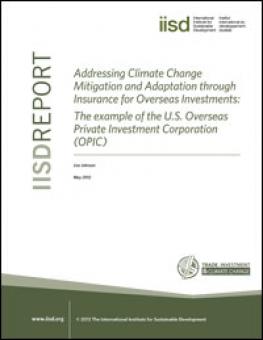
Addressing Climate Change Mitigation and Adaptation Through Insurance for Overseas Investments: The example of the U.S. Overseas Private Investment Corporation
The paper aims to illustrate the connections between government policy, investment and climate change; it looks at the role and activities of the United States Overseas Private Investment Corporation (OPIC) in catalyzing foreign direct investment and addressing climate change.
The paper provides an overview of OPIC and its activities, mission and functions, and background information on the development of OPIC's environmental and climate change specific policies. In addition, the paper focuses on OPIC's current policies related to climate change, and aims to establish to what extent OPIC may serve as a possible model for other institutions playing similar roles in catalyzing foreign direct investment.
You might also be interested in
December 2024 | Carbon Minefields Oil and Gas Exploration Monitor
In November 2024, 23 oil and gas exploration licences were awarded across five countries, with Russia granting the licences that account for the largest portion of embodied emissions.
Increased Support Needed to Achieve India's Clean Energy Goals
India is on track to achieve many of its 2030 clean energy goals but needs to step up government support measures to accelerate the deployment of offshore wind, electric vehicles, and green hydrogen, according to a new report.
The Role of Multilateral Development Banks for Low-Carbon Procurement in the Infrastructure Sector
This report examines the critical role of multilateral development banks (MDBs) in advancing low-carbon procurement within the infrastructure sector.
Why the Energy Charter Treaty Modernization Doesn't Deliver for Climate
The Energy Charter Conference adopted the "modernized" Energy Charter Treaty (ECT) on December 3, 2024. IISD's Lukas Schaugg explains what the modernization does, when it will enter into force, its tension with EU law, and why the reformed ECT can still hinder climate policies.